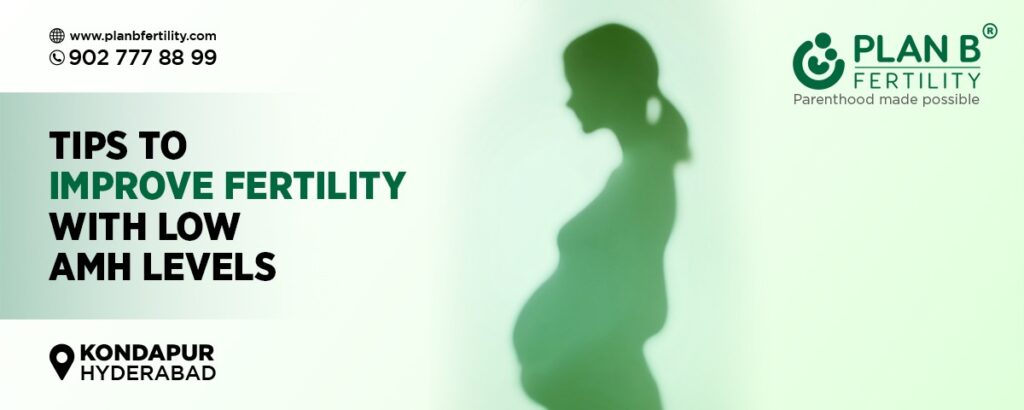Trying to conceive, especially for a long time with little to no success, is challenging and stressful, both for physical and mental health. Low AMH levels are often a factor affecting fertility and ovarian health. Let’s dive into an overview of AMH levels and how they affect fertility. We will also discuss some effective tips to improve the chances of getting pregnant for women with reduced AMH levels.
What is an AMH Level?
AMH, or Anti-Müllerian Hormone, is produced when follicles develop in a woman’s ovaries. It promotes the production of reproductive organs and helps regulate other hormones responsible for controlling the menstrual cycle. An AMH level, as the name indicates, is the measurement of this Anti-Müllerian Hormone present in the blood, and it acts as an indicator of a woman’s ovarian reserve.
AMH levels might vary based on age and sex, and medical practitioners often use this measure to diagnose various health conditions. For instance, a doctor might refer to AMH levels to identify and assess one’s reproductive health, infertility, ovarian tumors & menopausal symptoms.
Impact of Low AMH Levels on Fertility
Besides affecting egg quality, low AMH levels can impact the success rates of in-vitro fertilization (IVF) treatment procedures. Even if a few eggs are retrieved in the ovaries, their quality is usually poor to mature, resulting in fewer embryos and, hence, decreased pregnancy opportunities.
A woman, who is approaching or beyond the age of 30, is more prone to having low AMH levels. Besides, low Anti-Müllerian Hormone levels are sometimes associated with Premature Ovarian Failure (POF), a condition in which the ovaries no longer function prematurely, thus leading to infertility.
4 Tips to Improve Fertility with Low AMH Level
If you are planning to conceive but are suffering from low AMH levels, here are some low AMH fertility tips to increase your chances of conceiving.
1. Follow a Healthy Diet
Diet plays a crucial role in improving one’s fertility and overall physical and mental health. Make certain healthy dietary adjustments, such as consuming a nutrient-rich and balanced diet comprising vitamins, minerals, and antioxidants. Some recommended nutrients include omega-3 fatty acids, vitamins D and B-complex, folate, zinc, etc.
For instance, leafy green, nuts, and berries are rich in antioxidants, while walnuts, flaxseeds, and salmon (or other cold-water fish) are rich sources of omega-3 fatty acids. Besides, people with low AMH levels must also include healthy fats in their diets, such as olive oil, avocados, etc., to maintain good hormonal balance.
2. Taking Supplements
When our diet lacks certain nutrients, we must include those vitamins and minerals through supplements. Supplementation is a smart way to fulfill these nutritional deficiencies and improve our optimal health. For instance, healthcare professionals may recommend taking coenzyme Q10 (CoQ10) supplements, as it is rich in antioxidants that help maintain ovarian health by improving egg quality. Some gynecologists may also prescribe DHEA supplements to regulate or increase AMH levels.
3. Making Positive Lifestyle Changes
Individuals with AMH levels should develop healthy lifestyle habits and ditch the sedentary lifestyle. These activities and habits include managing stress, exercising daily, quitting smoking, limiting alcohol intake, getting adequate sleep, and minimizing exposure to environmental toxins. For example, you can join stress management programs, like yoga, meditation, and mindfulness.
4. Seeking Proper Treatment and Professional Help
You should visit a qualified fertility specialist to explore the probable treatment options for managing low AMH levels. If you face challenges with natural conception, you can opt for IVF treatment options tailored to your AMH levels. Another procedure is egg freezing, which helps preserve one’s fertility and is an ideal solution for individuals who are not planning a baby immediately.
What is the Best Place to Get Your AMH Levels Tested?
Plan B Fertility provides a range of fertility services for men and women, including blood tests, consultations, 2D and 3D ultrasound scans, semen analysis, in-house pharmacy, male and female fertility treatments, etc. If you want to check your AMH levels, our team will draw a minimal blood sample from your arm, just like any other blood test. Besides, Plan B Fertility Centre has committed and trained fertility specialists, nurses, embryologists, and operations staff, who will guide you throughout the fertility measurement procedures.
Key Takeaways
We hope the above tips will help you make informed decisions to treat or improve fertility with low AMH levels. However, individual outcomes might vary based on one’s underlying health conditions, genetics, lifestyle habits, age, the use of contraceptives, and other factors. Discuss your fertility potential with your gynac or fertility specialist, who will assist you in making the best treatment decisions.
